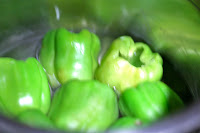How many of us actually think about
where our food comes from or under which conditions it is handled?
The Times of India begged this very question in an article a few days
ago about the Okhla Mandi.
http://articles.timesofindia.indiatimes.com/2012-04-12/delhi/31330500_1_mandi-vegetables-fruits
The Okhla Mandi is one of the key distribution points in the South Delhi, Gurgoan, Ghaziabad, and Faridabad areas for fruits and vegetables. Produce comes in from all directions to be distributed to sabziwallahs, restaurants, hotels, and other vegetable vendors. It certainly gives a lot to think about for the state of vegetable markets, and protecting the integrity of the produce while keeping customers and suppliers free from food-borne illness.
Key points from the article:
- The cleanliness of the Mandi has not been maintained at all
- The Agricultural Produce Market Committee is responsible for cleaning the Mandi, but has not followed through on their promise
- It is risky to buy vegetables and fruit that are not handled in a sanitary way. The probability of contamination is high given the current conditions and lack of maintenance.
- A quote from the article: “Physician Dr Praween Kumar says such unhygienic conditions can cause a variety of gastrointestinal diseases. 'Flies transmit infections. And vegetables and fruits kept in such conditions could contain larvae and maggots, which can cause faecal-oral and gastrointestinal diseases like diarrhoea, dysentery, cholera and even typhoid. Often we don't have alternatives so and hence we buy these vegetables; but if we do, we should wash them properly before cooking. If you are eating fruits raw, it may be safer to peel off the skin.'”
- Officials claim that the Mandi is cleaned regularly, but it seems upon walking in the reality is otherwise
It is incredibly important that safety
is put first and it is a shame that more is not being done to prevent
contamination, especially when so many people are eating produce from
this Mandi. And it's also important that consumers are aware about
what happens to their fruits and vegetables before it reaches the
table.
This is a reminder to all retailers to
highlight and focus on quality, and a good argument for sourcing
directly from farms. We're glad to see an article that highlights
such a critical public health issue, and is also a call for action.
You don't have to put up with veggies that also pose a health risk.
You have the choice to buy vegetables are are hygienically handled
and packed, and come straight from farmers that you can trust.
Hopefully both consumers and officials will step up and demand clean
produce.








